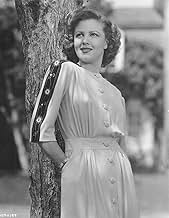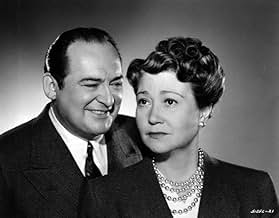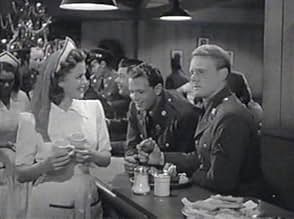A Washington official courts a society matron who is trying to ignore the effects of World War II.A Washington official courts a society matron who is trying to ignore the effects of World War II.A Washington official courts a society matron who is trying to ignore the effects of World War II.
- Nominated for 1 Oscar
- 1 win & 1 nomination total
Stephen McNally
- Peters
- (as Horace McNally)
Rags Ragland
- Louie
- (as 'Rags' Ragland)
Carl 'Alfalfa' Switzer
- Messenger Boy
- (as Carl Switzer)
Eddie Acuff
- Soldier in Canteen
- (uncredited)
- Director
- Writer
- All cast & crew
- Production, box office & more at IMDbPro
Featured review
This begins in an elegant manner and is a serious film. It has a fantastic cast, almost entirely made up of character actors. Edward Arnold could be the only one ho ever starred in A pictures, though Fay Bainter, in the title role here, could have been said to also.
Bainter's character lives in a bubble. She's a rich widow in Washington, DC, who refuses to pay attention to the sounds of W.W.II, right up through Pearl Harbor. Her daughter (Jean Rogers, not quite believable as a child of privilege) meets a military man, the young Van Johnson. Her alcoholic son is sent off to war by influential Arnold, rather than disgrace Bainter, whom he loves.
Etc.
It works well, even to the end, though it becomes less plausible as it moves toward its resolution. Would patrician Bainter/Hadley really embrace the working class mother-in-law of her daughter to such a degree? Seems unlikely.
There are strange overtones of homosexuality in this movie. At its start we see a bouquet being delivered to Bainter. It evolves that the woman who cuts her hair sent it. Everyone wonders why. Her friend Spring Byington says, "Maybe she's musical!" and all laugh. My understanding from older friends is that this was a code for gay/lesbian in the 1940s.
This could be my imagination, but the bouquet is never explained and w never again hear about, let alone see, the hair stylist.
Regardless, it's an elegant movie that, with a bigger budget, could have been a very fine one.
Bainter's character lives in a bubble. She's a rich widow in Washington, DC, who refuses to pay attention to the sounds of W.W.II, right up through Pearl Harbor. Her daughter (Jean Rogers, not quite believable as a child of privilege) meets a military man, the young Van Johnson. Her alcoholic son is sent off to war by influential Arnold, rather than disgrace Bainter, whom he loves.
Etc.
It works well, even to the end, though it becomes less plausible as it moves toward its resolution. Would patrician Bainter/Hadley really embrace the working class mother-in-law of her daughter to such a degree? Seems unlikely.
There are strange overtones of homosexuality in this movie. At its start we see a bouquet being delivered to Bainter. It evolves that the woman who cuts her hair sent it. Everyone wonders why. Her friend Spring Byington says, "Maybe she's musical!" and all laugh. My understanding from older friends is that this was a code for gay/lesbian in the 1940s.
This could be my imagination, but the bouquet is never explained and w never again hear about, let alone see, the hair stylist.
Regardless, it's an elegant movie that, with a bigger budget, could have been a very fine one.
- Handlinghandel
- Dec 31, 2004
- Permalink
Storyline
Did you know
- TriviaMGM arranged that the world premiere at the Lowe's Capitol Theatre in Washington, DC in September, 1942 would be a War Bond drive, with better seats going to those that bought more bonds. The effort raised $1,822,675 ($27.24M in 2017).
- GoofsWhen Stella goes to see Elliot at the Muntions Building, the view from his office window is of the Capitol Building and it is very close. This is not remotely possible. The Muntions Building was built on Constitution Avenue on the Mall between the Lincoln Memorial and the Washington Monument--roughly where the Vietnam Memorial now stands. In addition, the similar Main Navy Building stood between the Muntions Building and the Capitol.
- Quotes
Cecilia Talbot: [on being ordered to observe the blackout] Oh dear! It's just like the French Revolution!
- ConnectionsFeatured in Personalities (1942)
- SoundtracksHappy Birthday
(1893) (uncredited)
Written by Mildred J. Hill and Patty S. Hill
Sung a cappella by Carl 'Alfalfa' Switzer
Also sung a bit by Halliwell Hobbes
- How long is The War Against Mrs. Hadley?Powered by Alexa
Details
- Release date
- Country of origin
- Language
- Also known as
- Kriget mot Mrs. Hadley
- Filming locations
- Cal-Aero Academy, Chino Airport - 7000 Merrill Avenue, Chino, California, USA(Cal-Aero Academy closed 1944; airport called Cal-Aero Field when filmed)
- Production company
- See more company credits at IMDbPro
Box office
- Budget
- $307,000 (estimated)
- Runtime1 hour 26 minutes
- Color
- Aspect ratio
- 1.37 : 1
Contribute to this page
Suggest an edit or add missing content

Top Gap
By what name was The War Against Mrs. Hadley (1942) officially released in India in English?
Answer




































